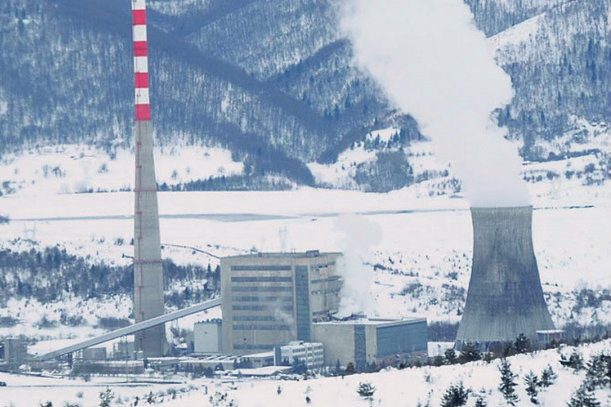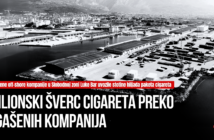Research Center of MANS warns that the new energy facility in Pljevlja would peppery cost
 The investment costs for the project of the Second Block of Thermal Power Plant in Pljevlja will be over billion euros, while the costs of health and environmental protection during the 40 years of operation of the new power plant are estimated at 2.5 billion euros, so the total cost price of new “dirty” energy sources in the country could reach a whopping sum of 3.5 billion euros, according to the analysis of the Research Center of MANS.
The investment costs for the project of the Second Block of Thermal Power Plant in Pljevlja will be over billion euros, while the costs of health and environmental protection during the 40 years of operation of the new power plant are estimated at 2.5 billion euros, so the total cost price of new “dirty” energy sources in the country could reach a whopping sum of 3.5 billion euros, according to the analysis of the Research Center of MANS.
The controversial project of construction of the Second Thermal Power Plant in Pljevlja the Government has proclaimed as one of the priorities in the energy sector. The new power plant should built Czech company Skoda Praha, but months of negotiations with the National Energy Company (EPCG) and the Government of Montenegro, as holders of the project, have not yet been completed due to the dispute over the method of financing investment.
The Government for months shows to domestic public only the costs of the construction of the Second Block, which include construction works and installation of equipment, which will be imported from abroad. Czech company Skoda Praha offered a price of 338 million euros for the construction of the block of 254 MW, of which a maximum of 85 percent could be provided through a loan of the Czech export bank.
However, in addition to construction of the Second Block total project follows a number of other costs, which are its integral part. In this sense, the Government in mid-2013 estimated cost-interest loans in the amount of 100 million, and the costs of opening new mines for the purposes of the Second Block at 145 million euros. Nor interest costs nor expenses of opening new mines Government today does not mention.
At the same time, Research Center of MANS calculated that the cost of re-cultivation for the closure of the mine, which is obligation under the Mining Act, will amount to 85 million euros. This projection made on the basis of re-cultivation costs per tonne of exploited coal that the coal mine Pljevlja counted back in 2010, and on the basis on calculation of how much coal will be spent until the end of operation of the First and Second Block.
In addition, it is well known that substantial funds have to be invested in the existing First Block of the Thermal Power Plant by the end of its work, in order to fulfill the strict requirements in terms of environmental protection required by the European Union. In this regard, the document of the Municipality of Pljevlja from 2013 states that the figure of 100 million euros must be invested in renovating the First Block.
Furthermore, additional costs represent expenses for the emission of carbon dioxide that the Government did not calculate, although it is expected that the European Union should establish a system for emissions trading or any other system, such as taxes, in which carbon dioxide emissions (which most are due to the work of Thermal Power Plants) will be paid. International NGO BankWatch estimated lowest cost of carbon dioxide emissions to 6.6 million per year, which is 264 million for 40 years of oparation of the Second Thermal Power Plant in Pljevlja.
The Government did not even show the expropriation costs, nor the costs of building new electricity infrastructure, new ash and slag landfills (at this point it is only known that the closure of the landfill Maljevac amount to 4 million euros), followed by a new ore landfill, costs of revitalization Borovicko lake, nor expenditures for the revitalization of the Second Block after 25 years of its operation.
However, what is particularly problematic is that costs of health and environmental protection are not included at all, which represent actual expenditure during the 40 years of work of the Second Block. In this regard, the international NGO Greenpeace in mid-2013, in collaboration with the University of Stuttgart, Germany, investigated the impact on the health of 300 large power plants in operation in the European Union, as well as the impact of 50 new projects if they come at the point of realization.
Using a sophisticated model of estimation of the impact on health, Greenpeace did an analasys, for the needs of Green Home from Podgorica, that showed that the cost of health and environmental protection for 40 years of opeartion of the Second Thermal Power Plant in Pljevlja will amount to 2.5 billion euros. Therefore, the calculation shows that the investment and the cost of health and environmental protection of the project for the Second Block together could amount to 3.5 billion euros, which would inevitably paid the Montenegrin taxpayers.
Therefore, it is very disturbing attitude of the Government of Montenegro, which insists on the construction of new source of energy based on coal, although previously did not provided a cost benefit analysis that would show whether the project of the Second Block of the Thermal Power Plant is profitable at all, or whether electricity produced in Thermal Power Plant can for 40 years to pay off the entire investment.
This text is made by the support of the European Union within the project “Zero tolerance to corruption”. For the contents of this article is solely responsibile the Network for Affirmation of Non-Governmental Sector – MANS, and views presented in this article can not be, in any case, considered as views of the European Union.
In the Second Block would work about 100 employees
According to official data of EPCG in the current First Block of the Thermal Power Plant at the end of 2014 were employed 207 workers. Having in mind that, in the First Block in 2010 were employed 333 workers, it is clear that in recent years this number has significantly dropped.
According to the Draft of the Detailed Spatial Plan for the Power Plant Pljevlja, which was at a public hearing in May last year, it was estimated that in the Second Block will employed up to 100 workers, which is due to the fact that it would be built more modern technology that involves a small number of highly technical and professionally trained staff.
Greater employment effects can only be expected during the construction of the Second Block of the Thermal Power Plant in Pljevlja, for which is announced that will be hired local construction companies.
By: Ines Mrdovic (MANS)



